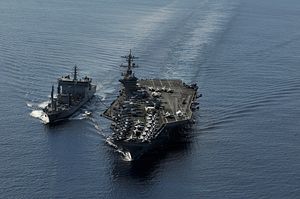Your Friday China reading:
Two fascinating pieces on China’s military strategy emerged this week. First, Abhijit Singh takes up the question of China’s naval ambitions in the Indian Ocean as part of the PacNet series hosted by CSIS. Singh points to China’s recent naval deployments in Sri Lanka as “evidence that Beijing has its sights set on dominating the Indian Ocean.” Particularly worrisome for Singh is the fact that China’s submarine did not dock with the Sri Lanka Port Authority in Colombo, but chose instead to dock “at the Colombo South Container Terminal (CSCT), a deep-water facility built, controlled and run by a Chinese company.” That and other dockings at the Chinese-built port, Singh explains, have strengthened “Indian suspicions that PLA-N assets are being allowed privileged access to Sri Lankan ports funded by Chinese investments.” Given China’s major push to invest in ports throughout Southeast and South Asia (and even Africa) as part of its Maritime Silk Road, the question of how (if at all) the PLA Navy plans to use these assets will only gain in importance.
Second, writing for Washington Quarterly, M. Taylor Fravel and Christopher P. Twomey take aim at “the myth of Chinese counter-intervention.” Anyone who follows U.S. military strategy has likely heard it said that the Chinese military employs a strategy of “counter-intervention,” seeking to prevent foreign military forces (read: the U.S.) from being able to interfere in a conflict close to China’s territory. Thus, U.S. strategic planning has focused on countering counter-intervention. As Fravel and Twomey note, U.S. analysts almost invariably attribute the emphasis on counter-intervention to Chinese strategists – but that assumption is not borne out by actual Chinese sources. Thus, the authors argue, the focus on counter-intervention “sustains a flawed assessment of China’s military modernization, mistaking an operational concept for a military strategy or even a grand strategy aimed at pushing the United States out of the Asian littoral.”
In other news, South China Morning Post reports that Shanghai’s government has become the first provincial- or municipal-level government to drop GDP growth targets from its annual work report. Instead, Mayor Yang Xiong said Shanghai’s goal was to “maintain steady growth while introducing structural optimization” and keeping unemployment below 4.5 percent. Experts both within China and abroad have been arguing that China’s national government should scrap its annual economic growth targets in order to focus fully on economic reforms (as Christopher Johnson discussed with The Diplomat in a recent video interview, starting at the 6:07 mark). Shanghai’s decision to actually break with tradition could be an important precedent in this regard; look for more local governments to follow suit. The national government, meanwhile, is expected to set China’s growth target at around 7 percent.
Finally, the Taliban have confirmed earlier reports that they sent representatives to China for talks. In a statement to Afghan media outlets, Taliban spokesman Zabihullah Mujahid confirmed that the visit took place, but denied that the purpose of the trip was to seek Chinese mediation on a peace deal between the Taliban and the Afghan government under President Ashraf Ghani. Instead, Mujahid said, the visit was “for making [a] relationship, enhancing ties and for the purpose [of] explaining our stance.” Mujahid added that the “Taliban will continue to visit neighboring countries and [the] world.”

































